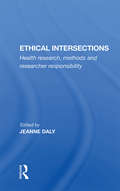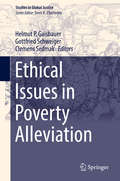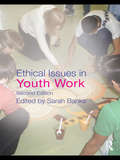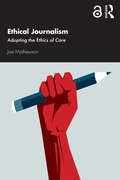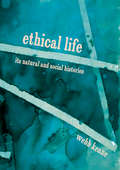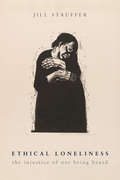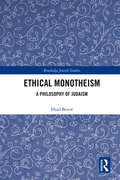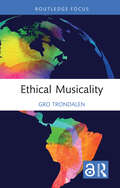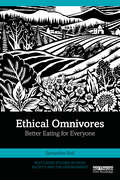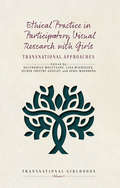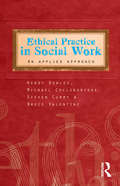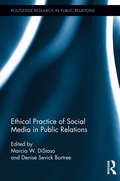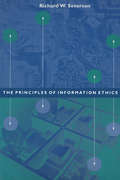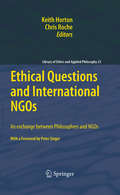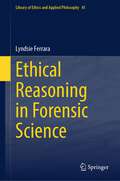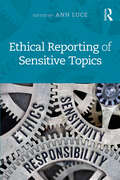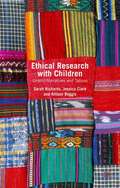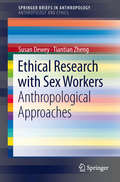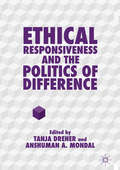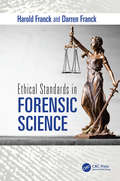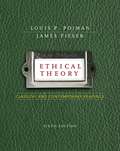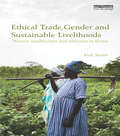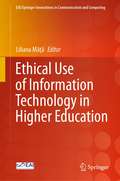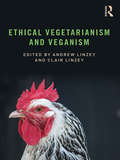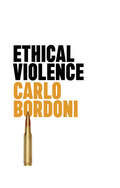- Table View
- List View
Ethical Intersections: Health Research, Methods And Researcher Responsibility
by Jeanne DalyThis book presents a collection of essays that aims to make public the social discourse on ethics of health research used by responsible, practising researchers in order to demonstrate the detailed and fine consideration given to the ethics of the research task.
Ethical Issues in Poverty Alleviation
by Gottfried Schweiger Helmut P. Gaisbauer Clemens SedmakThis book explores the philosophical, and in particular ethical, issues concerning the conceptualization, design and implementation of poverty alleviation measures from the local to the global level. It connects these topics with the ongoing debates on social and global justice, and asks what an ethical or normative philosophical perspective can add to the economic, political, and other social science approaches that dominate the main debates on poverty alleviation. Divided into four sections, the volume examines four areas of concern: the relation between human rights and poverty alleviation, the connection between development and poverty alleviation, poverty within affluent countries, and obligations of individuals in regard to global poverty. An impressive collection of essays by an international group of scholars on one of the most fundamental issues of our age. The authors consider crucial aspects of poverty alleviation: the role of human rights; the connection between development aid and the alleviation of poverty; how to think about poverty within affluent countries (particularly in Europe); and individual versus collective obligations to act to reduce poverty. Judith Lichtenberg Department of Philosophy Georgetown University This collection of essays is most welcome addition to the burgeoning treatments of poverty and inequality. What is most novel about this volume is its sustained and informed attention to the explicitly ethical aspects of poverty and poverty alleviation. What are the ethical merits and demerits of income poverty, multidimensional-capability poverty, and poverty as nonrecognition? How important is poverty alleviation in comparison to environmental protection and cultural preservation? Who or what should be agents responsible for reducing poverty? The editors concede that their volume is not the last word on these matters. But, these essays, eschewing value neutrality and a retreat into technical mastery, challenge us to find fresh and reasonable answers to these urgent questions. David A. Crocker School of Public Policy University of Maryland
Ethical Issues in Youth Work
by Sarah BanksThis fully updated new edition of Ethical Issues in Youth Work presents a comprehensive overview and discussion of a range of ethical challenges facing youth workers in their everyday practice. The first part offers a clear outline of the nature of professional ethics, relevant ethical theories and an overview of the policy and organisational context of youth work. The second part is grounded firmly in practice, with experts in the field exploring specific issues that raise ethical difficulties for youth workers, such as: • when to breach confidentiality • information sharing in inter-professional contexts • the ethics of youth participation and active citizenship • how to balance the roles of control, empowerment and education • negotiating personal and professional values, interests and commitments in youth work • dilemmas for faith-based and black and minority ethnic workers • issues for practitioner researchers. Ethical Issues in Youth Work offers a timely and unique insight into both the dilemmas of youth work practice and some of the more recent challenges faced by youth workers and all those working with young people in the light of current public attitudes and government policies towards young people.
Ethical Journalism: Adopting the Ethics of Care
by Joe MathewsonThis book makes the case for the news media to take the lead in combatting key threats to American society including racial injustice, economic disparity, and climate change by adopting an "ethics of care" in reporting practices. Examining how traditional news coverage of race, economics and climate change has been dedicated to straightforward facts, the author asserts that journalism should now respond to societal needs by adopting a moral philosophy of the "ethics of care," opening the door to empathetic yet factual and fair coverage of news events, with a goal to move public opinion to the point that politicians are persuaded to take effective action. The book charts a clear path for how this style of ethics can be applied by today’s journalists, tracing the emergence of this empathy-based ethics from feminist philosophy in the 1980s. It ultimately urges ethical news organizations to adopt the ethics of care, based on the human emotion prioritized by Scottish Enlightenment philosopher David Hume, and to pursue a more pro-active, solutions-seeking coverage of current events. This is an invaluable text for students and academics in the fields of journalism ethics, media ethics and media law, as well as for media professionals looking for a fresh perspective on practicing ethical journalism.
Ethical Life
by Webb KeaneThe human propensity to take an ethical stance toward oneself and others is found in every known society, yet we also know that values taken for granted in one society can contradict those in another. Does ethical life arise from human nature itself? Is it a universal human trait? Or is it a product of one's cultural and historical context? Webb Keane offers a new approach to the empirical study of ethical life that reconciles these questions, showing how ethics arise at the intersection of human biology and social dynamics.Drawing on the latest findings in psychology, conversational interaction, ethnography, and history, Ethical Life takes readers from inner city America to Samoa and the Inuit Arctic to reveal how we are creatures of our biology as well as our history--and how our ethical lives are contingent on both. Keane looks at Melanesian theories of mind and the training of Buddhist monks, and discusses important social causes such as the British abolitionist movement and American feminism. He explores how styles of child rearing, notions of the person, and moral codes in different communities elaborate on certain basic human tendencies while suppressing or ignoring others.Certain to provoke debate, Ethical Life presents an entirely new way of thinking about ethics, morals, and the factors that shape them.
Ethical Loneliness: The Injustice of Not Being Heard
by Jill StaufferEthical loneliness is the experience of being abandoned by humanity, compounded by the cruelty of wrongs not being acknowledged. It is the result of multiple lapses on the part of human beings and political institutions that, in failing to listen well to survivors, deny them redress by negating their testimony and thwarting their claims for justice. Jill Stauffer examines the root causes of ethical loneliness and how those in power revise history to serve their own ends rather than the needs of the abandoned. Out of this discussion, difficult truths about the desire and potential for political forgiveness, transitional justice, and political reconciliation emerge. Moving beyond a singular focus on truth commissions and legal trials, she considers more closely what is lost in the wake of oppression and violence, how selves and worlds are built and demolished, and who is responsible for re-creating lives after they are destroyed. Stauffer boldly argues that rebuilding worlds and just institutions after violence is a broad obligation and that those who care about justice must first confront their own assumptions about autonomy, liberty, and responsibility before an effective response to violence can take place. In building her claims, Stauffer draws on the work of Emmanuel Levinas, Jean Améry, Eve Sedgwick, and Friedrich Nietzsche, as well as concrete cases of justice and injustice across the world.
Ethical Monotheism: A Philosophy of Judaism (Routledge Jewish Studies Series)
by Ehud BenorThe term Ethical Monotheism is an important marker in Judaism’s tumultuous transition into the modern era. The term emerged in the context of culture-wars concerning the question of whether or not Jews could or should become emancipated citizens of modern European states. It appeared in arguments whether or not Judaism could be considered a Religion of Reason—a symbolic, motivational representation of a universal morality, and in debates about whether or not Judaism could or should reform itself into a Religion of Reason. This book is both a decisive departure from such discussions and an attempt to add a further, post-modern, statement to their ongoing development. As departure, it refuses to take for granted a philosophical conception of Religion of Reason as the standard for Ethical Monotheism according to which Judaism was to be evaluated or reformed. As continuation, the book undertakes a phenomenology of Jewish modes of ethical religiosity that allows it to inquire what kind of ethical monotheism Judaism might be. Through sophisticated analysis of select "snapshots," or "fragments of a hologram," guided by a robust theory of religion, the author discloses Judaic ethical monotheism as an ongoing wrestling with the meaning of justice. By closely examining five main "snapshots" of this long process—the Bible, rabbinic Judaism, Maimonides, The Zohar, and the modern philosophers, Buber and Levinas—the author offers his own constructive philosophy of Judaism and his own distinctive philosophy of religion. Ethical Monotheism offers a new way to think about Judaism as a religion and as a coherent philosophical debate, and demonstrates the need to integrate philosophy, history, cognitive psychology, anthropology, theology, and history of science in the study of "religion."
Ethical Musicality (Music and Change: Ecological Perspectives)
by Gro TrondalenEthical Musicality addresses the crossroads between music and ethics, combining philosophical knowledge, theoretical reflection, and practical understanding. When tied together, music and ethics link profoundly, offering real-life perspectives that would otherwise be inaccessible to us. The first part elucidates music and ethics through some influential and selected scholars ranging from Antiquity via modern philosophy to contemporary voices. In the second part, different roles and arenas are illustrated and explored through various music practices in real-life encounters for the musician, the music educator, the music therapist, the musicologist, the ‘lay’ musician, and the music researcher. The third part unfolds an ethical musicality focusing on the body, relationship, time, and space. Following these fundamental existentials, ethical musicality expands our lifeworld, including context, involvement, power, responsibility, sustainability, and hope. Such an ethical musicality meets us with a calling to humanity - offering hope of a ‘good life’.
Ethical Omnivores: Better Eating for Everyone (Routledge Studies in Food, Society and the Environment)
by Samantha NollThis book provides a detailed overview of ethical omnivorism, as well as the philosophical foundations of this movement and diet.Many eaters are concerned about the impact that their food choices have on the environment, animals, and human health. Ethical omnivorism is at once a new food ethic, diet, and global movement aimed at providing a flexible path for eaters committed to bringing about lasting change one meal at a time. While publications in food ethics are largely dominated by vegetarian titles, this book explores the viability of omnivorism, a dietary choice which is not devoid of animal products, but one which embraces eating local, eating organic, and eating humanely raised food products. In doing so, this diet builds on the local food movement’s desire to know where food comes from and stresses the importance of maintaining high animal welfare and environmental standards. Overall, this book provides a foundational overview of ethical omnivorism as a food movement and guidance for those interested in eating ethically, while recognizing that many factors influence dietary choices.This book will be of great interest to students and scholars of food studies, food, agriculture and animal ethics, environmental philosophy, and those more widely interested in making ethical food choices.
Ethical Practice in Participatory Visual Research with Girls: Transnational Approaches (Transnational Girlhoods #2)
by Relebohile Moletsane, Lisa Wiebesiek, Astrid Treffry-Goatley, and April MandronaGirls and young women, particularly those from rural and indigenous communities around the world, face some of the most adverse social issues in the world despite the existence of protective laws and international treaties. Ethical Practice in Participatory Visual Research with Girls explores the potential of participatory visual method (PVM) for girls and young women in these communities, presenting and critiquing the everyday ethical dilemmas visual researchers face and the strategies they implement to address them, reflecting on principles of autonomy, social justice, and beneficence in transnational, indigenous and rural contexts.
Ethical Practice in Social Work: An applied approach
by Wendy Bowles Michael Collingridge Bruce Valentine Steven CurryThis innovative text shows why ethics is so important for social work practice, that it is not simply a way of defining and understanding what is good in practice, but is a means by which social work and other caring professions can actually achieve good practice.'Professor Richard Hugman, University of NSW This book integrates ethical theory and political philosophy into a clear yet challenging framework for ethical action in social work. Firmly grounded in practice examples, it will be of great interest both to students and practitioners in the field.' Professor Sarah Banks, Durham UniversityIn an increasingly fragmented and regulated world, the authors of Ethical Practice in Social Work argue that social work has become detached from its ethical roots. Their aim is to reinstate ethics as the driving force of good social work and welfare practice. Ethical Practice in Social Work provides the tools to develop essential ethical decision-making and problem-solving skills. Taking an applied approach with case studies in each chapter, the authors demonstrate how ethical principles can be used to transform practice into an effective, inclusive and empowering process for both professionals and their clients. They discuss the ethical principles social workers have traditionally adhered to, the role of the good social worker' in the contemporary context, professionalism, and the way in which ethics can be used to reconcile the often differing demands of employers, community groups, clients, the profession and their own personal values. Ethical Practice in Social Work is a valuable professional reference and student text.
Ethical Practice of Social Media in Public Relations (Routledge Research in Public Relations)
by Marcia W. DiStaso Denise Sevick BortreeGiven the high rate of social media use by the public, organizations are compelled to engage with key audiences through these outlets. Social media engagement requires organizations to actively participate with public groups, and this highly-interactive exchange raises a new set of ethical concerns for communicators. In this rapidly changing communications environment, the long-term implications of social media are uncertain, and this book provides the much needed research to understand its impact on audiences and organizations. Through an examination of a broad range of ethics concepts including transparency and online identities, policies, corporate responsibility, and measurement, this book explores a variety of topics important to public relations such as diversity, non-profit communication, health communication, financial communication, public affairs, entertainment communication, environmental communication, crisis communication, and non-profit communication. The chapter authors, expert scholars within their fields of public relations, offer insights drawn from original research and case study examples of ethical dilemmas raised by social media communication.
Ethical Principles for the Information Age
by Richard SeversonThis text presents the author's model of following principled ethics together with by chapters on each of the guiding principles: respect for intellectual property, principle of fair representation, privacy, and the principle of nonmalfeasance. It avoids the use of technical jargon.
Ethical Questions and International NGOs
by Keith Horton Chris RocheIn recent decades there has been a great expansion in the number, size and influence of International Non-Governmental Organisations (INGOs) involved in international relief and development. These changes have led to increased scrutiny of such organisations, and this scrutiny, together with increasing reflection by INGOs themselves and their staff on their own practice, has helped to highlight a number of pressing ethical questions such organisations face, such as: should INGOs attempt to provide emergency assistance even when doing so risks helping to fuel further conflict? How should INGOs manage any differences between their values and those of the people they seek to benefit? How open and honest should INGOs be about their own uncertainties and failures? This book consists of sustained reflections on such questions. It derives from a workshop held at Melbourne University in July 2007 that brought together a group of people - for the most part, reflective practitioners and moral and political philosophers - to discuss such questions. It explores honestly some of the current challenges and dilemmas that INGOs face, and also suggests some new ideas for meeting these challenges. Our hope is that the kind of explicit reflection on the ethical issues INGOs face exemplified in this publication will help to promote a wider debate about these issues, a debate that in turn will help INGO managers and others to make better, wiser, more ethically informed decisions.
Ethical Reasoning in Forensic Science (Library of Ethics and Applied Philosophy #41)
by Lyndsie FerraraThis book explores the impact of ethical reasoning in forensic science and demonstrates that it is in fact a foundational skill required by those engaged in the field. Forensic science is viewed as a mechanism to aid the criminal justice system in finding truth, but failures within the field contribute to the growing injustice facing society. The author recognizes these failings and brings a new perspective by establishing bioethical principles as a foundation for improving ethical reasoning skills. These skills are a critical component of forensic science education for upcoming professionals. While other books focus on egregious cases of ethical misconduct, this text highlights the daily decisions and issues that occur during the forensic investigation and analysis processes. It is written for future forensic professionals and forensic science educators, as well as those individuals already working in the forensic science field.
Ethical Reporting of Sensitive Topics
by Ann LuceEthical Reporting of Sensitive Topics explores the underlying complexities that journalists may face when covering difficult news stories. Reporting on issues such as suicide, sexual abuse, or migration is a skill that is often glossed over in a journalist’s education. By combining theory and practice, this collection will correct this oversight and give journalists the expertise and understanding to report on these subjects responsibly and ethically. Contributors to this volume are an international group of journalists-turned- academics, who share their first-hand experiences and unique professional insight into best ethical journalistic practice for reporting on sensitive topics. Drawing from a range of case studies, contributors discuss the most appropriate approach to, for example, describing a shooter who has killed a group of schoolchildren or interviewing someone who has lost everything in a natural disaster. Readers are invited to consider factors which have the potential to influence the reporting of these sorts of topics, including bias, sensationalism, conflict of interest, grief, vulnerability, and ignorance of one’s own privilege. Ethical Reporting of Sensitive Topics aims to support all journalists, from students of journalism and individuals encountering a newsroom for the first time, to those veteran journalists or specialist journalists who seek to better their reporting skills.
Ethical Research with Children: Untold Narratives And Taboos
by Jessica Clark Sarah Richards Allison BoggisAn increasing interest in children's lives has tested the ethical and practical limits of research. Rather than making tricky ethical decisions, transparent researchers tend to gloss over stories that do not fit with sanitized narratives. This book aims to fill this gap by making explicit the lived experiences of research with children.
Ethical Research with Sex Workers
by Susan Dewey Tiantian ZhengThis volume is the result of the many years the authors have spent conducting ethnographic field research with sex workers, conversing with other researchers, and, perhaps most importantly, developing a deep sense of empathy for the sex worker participants in the research as well as the colleagues who carry out this work with the goal of advancing social justice. They have a combined total of twenty-five years' experience carrying out research with sex workers, and this extensive period of time has given them ample opportunity to reflect upon the topic of ethics. Sex work, defined as the exchange of sexual or sexualized intimacy for money or something of value, encompasses a wide range of legal and illegal behaviors that present researchers with key ethical challenges explored in the volume. These ethical challenges include: · Research methodology · Distinguishing research from activism · Navigating the politically and ideologically charged environments in which researchers must remain constantly attuned to the legal and public policy implications of their work · Possibilities for participatory sex work research processes · Strategies for incorporating participants in a variety of collaborative ways Sex work presents a unique set of challenges that are not always well understood by those working outside of anthropology and disciplines closely related to it. This book serves an important function by honestly and openly reviewing strategies for overcoming these ethical challenges with the end goal of producing path-breaking research that actively incorporates the perspectives of research participants on their own terms. Ever attuned to the reality that research on sex work remains a deeply political act, Ethical Research with Sex Workers: Anthropological Approaches aspires to begin a dialogue about the meanings and practices ascribed to ethics in a fraught environment. Drawing upon a review of published scholarly and activist work on the subject, as well as on interviews with researchers, social service providers, and sex workers themselves, this volume is an unprecedented contribution to the literature that will engage researchers across a variety of disciplines, such as academics and researchers in anthropology, sociology, criminal justice, and public health, as well as activists and policymakers.
Ethical Responsiveness and the Politics of Difference
by Anshuman A. Mondal Tanja DreherThis edited collection focuses on the ethics, politics and practices of responsiveness in the context of racism, inequality, difference and controversy. The politics of difference has long been concerned with speech, voice and representation. By focusing on the practices and politics of responsiveness—listening, reading and witnessing—the volume identifies vital new possibilities for ethics and social justice. Chapters focus on the conditions of possibility, or listening as ethical praxis; unsettling or disrupting colonial relationships; and ways of listening that highlight non-Western traditions and move beyond the liberal frame. Ethical responsiveness shifts some of the responsibility for negotiating difference and more just futures from subordinated speakers, and on to the relatively more privileged and powerful.
Ethical Standards in Forensic Science
by Harold Franck Darren FranckEthical Standards in Forensic Science seeks to address the myriad practices in forensic science for a variety of evidence and analyses. The book looks at ethics, bias, what constitutes an expert in the field—both as a practitioner and to the court system—as well as the standards of practice as purported by the top forensic organizations. Coverage addresses evidence collection, chain of custody, real versus "junk" science, the damage questionable science can cause to a discipline and the judicial process, testing methods, report writing, and expert witness testimony in civil and criminal cases in a court of law. The authors’ background in engineering provides a unique perspective on a variety of evidence and testing methods. As such, in addition to coverage the range of evidence and topics cited in the 2009 National Academy of Sciences (NAS) Report, they address numerous challenges that have arisen specifically in forensic engineering cases—their specific area of expertise. Numerous case example are provided to illustrate the inherent danger of bias, inexact science, or expert witnesses taking dangerous and harmful liberties on the stand. Students, lawyers, and professionals in all forensic disciplines will find this a refreshing and accessible approach to elucidate the problem and offer suggestions for reform and change for the good of the entire profession.
Ethical Theory: Classical and Contemporary Readings
by Louis P. PojmanThis authoritative and reader-friendly anthology will help you think through some of humanity's most persistent questions regarding right and wrong, good and bad. ETHICAL THEORY: CLASSICAL AND CONTEMPORARY READINGS cuts through the confusion and delivers a clear and comprehensive selection of readings from classical and contemporary sources. Presented in a dynamic pro and con format, with detailed summaries of each argument, this comprehensive anthology allows you to watch the ethical debate unfold before your eyes.
Ethical Trade, Gender and Sustainable Livelihoods: Women Smallholders and Ethicality in Kenya
by Kiah SmithFair and ethical trade is often criticized for being highly gendered, and for institutionalizing the ethical values of consumers, the priorities of NGOs and governments, and most of all, food retailers. But little is known about how women smallholder farmers experience diverse ethical standards, or whether and how standards reflect their values, local cultural and environmental contexts, or priorities for achieving sustainable livelihoods. Linking gender, smallholder livelihoods and global ethical trade regulations, this book reveals that multiple understandings of social justice, environmental sustainability and well-being – or ethicality – exist in parallel to those institutionalized in ethical trade schemes. Through an in-depth case study of smallholder subsistence and French bean farming in Kenya, the book grounds the analysis of livelihoods, gender and ethical trade in women smallholders’ perspectives, links the macro level of markets with the micro level of livelihoods, and engenders relations of power, structure and agency in food networks. It brings together disparate bodies of theory to illustrate the knowledge, strategies and values of women smallholder farmers that are often beyond the scope of ethical trade regulations. It also provides a challenging new vision for doing food systems research.
Ethical Use of Information Technology in Higher Education (EAI/Springer Innovations in Communication and Computing)
by Liliana MâțăThis book addresses current issues regarding the ethical use of information technology in a holistic vision, by combining the perspectives of education specialists and those in the field of computer science at the level of higher education. It provides a current ethical perspective on the problems and solutions involved in the use of information technology in higher education. It appeals to readers interested in exploring the problems and appropriate solutions related to the ethical use of new technologies in higher education.
Ethical Vegetarianism and Veganism
by Andrew Linzey Clair LinzeyThe protest against meat eating may turn out to be one of the most significant movements of our age. In terms of our relations with animals, it is difficult to think of a more urgent moral problem than the fate of billions of animals killed every year for human consumption. This book argues that vegetarians and vegans are not only protestors, but also moral pioneers. It provides 25 chapters which stimulate further thought, exchange, and reflection on the morality of eating meat. A rich array of philosophical, religious, historical, cultural, and practical approaches challenge our assumptions about animals and how we should relate to them. This book provides global perspectives with insights from 11 countries: US, UK, Germany, France, Belgium, Israel, Austria, the Netherlands, Canada, South Africa, and Sweden. Focusing on food consumption practices, it critically foregrounds and unpacks key ethical rationales that underpin vegetarian and vegan lifestyles. It invites us to revisit our relations with animals as food, and as subjects of exploitation, suggesting that there are substantial moral, economic, and environmental reasons for changing our habits. This timely contribution, edited by two of the leading experts within the field, offers a rich array of interdisciplinary insights on what ethical vegetarianism and veganism means. It will be of great interest to those studying and researching in the fields of animal geography and animal-studies, sociology, food studies and consumption, environmental studies, and cultural studies. This book will be of great appeal to animal protectionists, environmentalists, and humanitarians.
Ethical Violence
by Carlo BordoniHuman civilization is founded on ethical principles, norms of behaviour that have accumulated over time. Perhaps the oldest of ethical principles is the rejection of violence, which includes the respect for life and for the physical and psychological integrity of others. But, in some circumstances, violence itself can be regarded as ethical – for example, when it is used by states claiming to act in self-defence. In these circumstances, the need to defend oneself against an enemy can transform war from an unacceptable act into a necessary, socially shared and morally sanctioned choice. And it is when violence becomes ethical that we must begin to fear for our future. In the wake of the pandemic, we are witnessing the growing prevalence of aggression and emotionality in social and political life. We find ourselves living in an increasingly impatient and insecure society, which is sceptical of scientific thought and which takes refuge in the irrational. The decline of rationality and the growing prevalence of violence are increasingly common features of a society that has lost touch with the great Enlightenment narrative. We need, argues Bordoni, to rediscover the rationality we have lost and recuperate the positive side of technology.
